Читать книгу Night Trap - Gordon Kent, Gordon Kent - Страница 7
15 March. 0121 Zulu. Near Heathrow.
ОглавлениеWhere the road makes a bend toward Iver, there is a stone bridge over a little river. At the Iver end of the bridge, if you look to the right, a sign is visible among the branches announcing the private grounds of a fishing club; there is a metal gate.
The unremarkable man in the raincoat and eyeglasses turned down toward this gate, hardly slowing although the path was dark and wet. He produced a key, unlocked the gate, and went through. As he had in Amsterdam, he went up the bank instead of along the path, this time examining the fence with a tiny flashlight and satisfying himself that the old breaks and holes were still there. The lock and the gate, it appeared, were mostly symbolic.
Again, he waited and watched. The sky was dull copper from London’s light on the low clouds; out on the bridge, glowing spheres of mist formed around streetlamps. After six minutes, a silhouette moved slowly to the center of the stone bridge—an overweight man, black among the bare black branches; he leaned over, seemed to study the water but actually looked up and down the fishing length. Then he, too, let himself in at the gate; unlike the small man, he moved uncertainly, and he swore once and then put on a light that he carried covered in his fingers so that only bits of it seemed to fall at his feet. He came along the fisherman’s path, breathing heavily.
The man in the raincoat spoke a name. Fred. Not quite a whisper, hoarse, betraying an accent: Fr-r-red. The other man turned. He was a little frightened. In the soft light from the bridge, he could be seen to have heavy lips and the kind of thick eyelids that look as if they have been weeping.
The man in the raincoat went down to him. He spoke with what seemed to be urgency, one hand extended, the other in his coat pocket. Again, there was a sense of selling something, of persuasion; his head cocked as Fred lowered his eyes; he might almost have been trying to get below Fred’s face, to look up into it. A word was audible, as if it was so important it had been spoken louder, extended: money.
Fred rubbed his fat chin. Both men looked around. Fred looked up at the glowing sky, said something, laughed. Nervous laughter.
The smaller man leaned in again. He repeated the question. Well? Yes or no?
Whatever Fred said, it was barely muttered, certainly not emphatic; but it was enough, and the smaller man smiled, nodded, took Fred’s upper arm and squeezed the muscle, then patted it. Good dog. Fred grinned.
They spoke for another two minutes. Mostly, the small man explained. Fred nodded or muttered understanding. Then abruptly, the smaller man hit Fred on the arm again and walked off.
Eight minutes later, he was standing beside a telephone in the shadow of a closed pub. He lit his tiny flashlight. He took out the white card. He passed over the first name with its minus sign. His pen touched Fred’s name. He made a small plus.
The pen passed down to the third name: Clanwaert.
He checked his watch. Then he dialed a number in Moscow and waited while the long, clumsy connection was made, all that antiquated technology, and a man’s voice answered, and he said, “Tell them, ‘Get ready.’”
